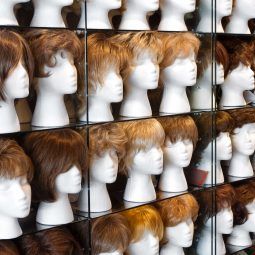
What to Do About Hair Thinning During Menopause
The proper supplements and hair care can help alleviate those unwanted symptoms.
Many women experience hair thinning or loss during menopause, and while this is a natural occurrence, losing or thinning hair is a distressing side effect that, on top of the slew of hormonal changes the body goes through, is the last thing anyone needs. Because changes to hair during menopause can be a scary thing, we’ve created a helpful guide about what it is, why it happens and offer up some ways to help alleviate its side effects.
This article was created in partnership with Nutrafol, a company in which Unilever is an investor.
Menopause and Hair Loss
What is menopause?
For many women, menopause starts in their late 40s to early 50s. As the body ages, the production of estrogen and progesterone starts to decrease. These hormones control ovulation and menstruation. Menopause starts when ovaries stop releasing eggs, thus stopping menstruation. It has three stages: perimenopause, menopause and postmenopause. There isn’t a set period for each stage. Perimenopause, the first stage of menopause, can start when a woman reaches her mid-40s. It’s during this phase that irregular periods, mood swings and yes, thinning hair can start.
Does your hair change during menopause?
For some women, changes in hair texture and thickness during menopause may not be very apparent at first. For example, if you tend to shed a considerable amount of hair during brushing, styling or washing, then hair loss during menopause or perimenopause may not raise any immediate red flags. The effect of menopause on hair health can vary, some women may experience hair that, once strong and full, now seems weak, brittle and thin compared to other women.

Those same hormones that regulate reproduction also affect hair and bone density. Stress and diet can accelerate hair loss during all three stages of menopause, too. While it’s always important to eat healthy, exercise and minimize stress, it’s especially important to do so during this transitional phase.
Understand that while this is a frustrating experience, it is also a normal side effect of menopause. Nutrafol is a company focused on helping people grow healthier hair at all stages of life by taking a new approach: hair wellness. If you want to better understand how to treat your thinning hair Nutrafol’s Hair Wellness Evaluation can help shed some light.
(A special offer from our friends at Nutrafol: Save $20 off your first-month subscription with code AllThingsHair at nutrafol.com until December 31, 2019)
Is menopausal hair loss permanent?
While some men might be able to get away with a bald look, the case may not be the same for women. Menopausal hair loss doesn’t have to be permanent. There are many solutions, ranging from cosmetic and easy enough for every day, like wearing wigs and taking supplements, to medical options like hair transplants, platelet-rich plasma (PRP) treatments and scalp micropigmentation.

Nutrafol Women, which received Allure magazine’s 2018 Breakthrough Award, is a nutraceutical supplement that has been clinically shown to improve hair growth and hair quality. Nutrafol Women’s Balance is formulated specifically for women facing hair issues related to perimenopause and menopause and can help return hair to its former glory with only natural ingredients. The supplements contain clinically tested, patented ingredients that address the root causes of thinning hair and boost hair growth, including Saw Palmetto, Maca, Ashwagandha, astaxanthin and other nourishing herbs and vitamins.
7 Ways to Help Hair Loss Issues During Menopause
As you make your journey through perimenopause, menopause and postmenopause, there are things that you can do to minimize hair loss. Realize that this is a journey, not a stop, and things can and do get better. Below are seven ways to alleviate hair loss during menopause:
1. Change up your hairstyle
Quick fixes, like changing your hair part or styling hair differently, can give your roots a much-needed boost and, as such, give hair more body and volume. The right haircut—one that works with your hair’s new density and texture—can help make hair appear fuller and healthier.

2. De-stress
Oftentimes stress and menopause can incite the perfect storm. While your body is going through the physical stress of transitioning into menopause, it’s also dealing with emotional, mental or lifestyle stress that can compound the effects on your hair, skin, and more importantly, your outlook. Meditation, spending quality time with family and friends, socialization, a healthy fitness routine, and even seeing a specialist in menopause therapy and mid-life issues for women can help manage stress levels and keep your mental health in check.
3. Eat healthy
In addition to thinning hair, another side effect of menopause is weight gain due to a slowing metabolism. Diligence sticking to a healthy diet high in vitamins and minerals is highly beneficial, no matter what stage of life you find yourself in.
4. Take supplements
Menopause hair supplements like Nutrafol Women’s Balance can lend the support you need during this hormonal change. These supplements help return hair’s natural luster, thickness and overall healthy look and feel with natural ingredients. The best nutrients for hair growth are found in their formulas, which include a patent-pending Synergen Complex, curcumin, tocotrienols, marine collagen, biotin and more. After using Nutrafol Women’s Balance for three months, over 80 percent of users reported that their hair felt stronger, had better texture, and was shedding less.

5. Invest in SPF
SPF is a must for all stages of life, but hair can be especially vulnerable during menopause, as it undergoes changes in texture and hormones. UVA and UVB rays can harm and cause damage to strands by altering their hue and making them dry and brittle. Opt for hair care products like leave-in moisturizers and finishing sprays that contain SPF for an extra layer of protection.
6. Exercise
Taking brisk walks, doing yoga, Pilates or straight-up working out at the gym can do wonders for your mental outlook and physical well-being. Staying active is a great way to de-stress, manage weight, keep social and have fun! Poor lifestyle choices can exacerbate the effects of menopause on hair loss, so lace up those sneakers and try walking around the block a few times to give both your mind and body the boost it needs.
7. Change your hair care routine
Your hair needs are changing, so your hair care should, too. Look for hair care products that are targeted towards thinning hair, as these have gentler formulas that can also help boost fullness and infuse strands with much-needed nourishment.
A special offer from our friends at Nutrafol: Save $20 off your first-month subscription with code AllThingsHair at nutrafol.com until December 31, 2019.

